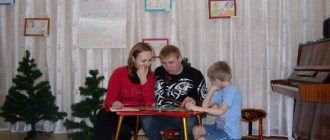Every day, a kindergarten teacher, interacting with children and their parents, receives information about the characteristics of the psychophysiological development of children, the nuances of education, and some family problems. A parent meeting is a tool that will help expand contact between teachers and parents, involve parents in the life of the group and kindergarten, help the family in proper upbringing, and improve the pedagogical culture of parents.
The minutes of a parent meeting in a kindergarten are a special document recording the progress of the meeting, as well as the issues that were raised and the decisions that were made.
Thus, a parent meeting at a preschool educational institution is an opportunity to build a dialogue between parent and teacher, identify questions and problems, and find solutions to them. And the protocols will record these issues and decisions.
Protocols of parent meetings in kindergarten
How to hold a meeting in kindergarten
Parent meetings are held throughout the kindergarten and only in a separate group. In addition, depending on the issues raised at the meeting, the following can be distinguished:
- current;
- thematic;
- organizational;
- final.
Any type of meeting will require the organizers to prepare, search for approaches to parents, because it is necessary not only to share some information with them, but also to reach them, to try to “mobilize” them for some specific actions, for example, in analyzing behavior or raising a child. Sometimes it is even difficult to ensure the attendance of parents.
The presence of parents is mandatory when considering the following issues:
- reporting information about the educational process and results;
- innovations in the field of preschool education;
- conflict resolution;
- if cooperation with parents is mandatory, then making decisions on all functional changes in the work of the preschool educational institution.
At the end of the meeting, the minutes of the parent meeting in the kindergarten are drawn up and signed.
Helpful information
The teacher offers an introduction to the individual characteristics of each preschool age in an unusual form. He gives the parents present at the meeting certain cards, which indicate the mental and physical characteristics of the children:
- At this age, children love to listen to fairy tales.
- By the age of five, children begin to complain that other children do certain tasks and assignments incorrectly.
- At 4-5 years of age, a child’s growth stops at 4-5 centimeters per year.
- Until the age of 5, it is important to protect a child from serious physical activity that leads to spinal deformation.
It is useful to include a speech by a medical worker or child psychologist at parent meetings in the junior group of kindergarten. They will not only introduce mothers and fathers to the age and physical characteristics of their children, but will also give advice on conducting diagnostic studies.
During a meeting with parents, the teacher can talk about the importance of children doing simple physical work and small errands. For example, a baby can wash the floor, wipe the dust, or vacuum the carpet in the room.
Scientists have found that the first five years of life are the golden time for identifying and improving giftedness. At the age of 4-5, children learn to respect their elders, build relationships with peers, and leaders emerge among them.
Parents should also be informed that the lens of a preschooler's eye is different in shape from that of an adult. That is why it is so important to pay attention to the lighting of the desktop, at which a preschooler reads, draws, and plays.
To teach a child the rules of behavior, it is not enough to simply tell them. It is important that the child periodically performs such actions, that is, practice the received theoretical information. Only through the formation of skills, their development, and gradual complication, can you count on achieving the task.
Stages of a meeting
During the meeting, the following key stages can be distinguished:
- Organization . At this stage, the organizers should notify the participants and ensure their attendance at the meeting, prepare presentations or other materials that will help clarify the issues being discussed. You can also write letters of gratitude for parents who take an active part in the life of the preschool educational institution. At the same stage, the room for the meeting is prepared.
- Creating a script and conducting meetings etc. The event should consider the achievements of children; preschool workers talk about the relationships between children in the group, without giving negative assessments to children and their parents. The mood of the audience should remain positive throughout the meeting. Also, the meeting should help parents and teaching staff discuss all issues of interest or problems that have arisen.
- Analysis of the event results. At the end of the meeting, you need to summarize all the conclusions that were made and outline the decisions. Next comes the preparation of the protocol and filling out questionnaires (if any) for parents.
A parent meeting can be considered well organized when the following principles are met:
- the meeting did not take long;
- new data were presented;
- The meeting was not only theoretical, but also practical.
How are the minutes of the parent meeting drawn up?
During the meeting, it is necessary to draw up minutes - this is done by the secretary of the event. It can be any preschool teacher. The secretary can develop and use a pre-created minutes template and complete it during the meeting. Templates and samples of protocols for parent meetings in kindergarten are presented at the end of the article.
Minutes of preschool educational institutions meetings:
- record the progress of the meeting;
- provide a report to senior management on the implementation of assigned tasks;
- record existing orders;
- provide the opportunity to receive a report on the execution of tasks;
- help in resolving disputes.
The legislation does not oblige the use of certain frameworks for document execution. It can be drawn up on A4 paper and filled out manually or using a computer. The document header should contain:
- name of the preschool institution;
- theme of the meeting;
- date and location;
- number of participants.
The “Agenda” section should display the issues that will be discussed. They need to be formulated briefly.
The “Reports” section contains:
- a summary of the participants' speeches;
- questions from participants;
- answers to them.
At the end of the meeting, the minutes should contain all the information about the various issues discussed at the meeting, all the reports, as well as the solutions reached.
The minutes of the parent meeting in kindergarten must be certified by the chairman and secretary of the meeting. Sometimes the protocol is also signed by members of the parent committee. If the purpose of the meeting was to inform parents about something important (For example: a flu epidemic, the danger from ticks, etc.), you can draw up a “Familiarization Sheet.” It is signed by all those present and added to the minutes of the meeting as an appendix.
Decisions made during the meeting are binding on all children and parents, regardless of their presence at the meeting. If an important decision was made during the meeting, it is necessary to familiarize all parents with it (even those who were absent). To do this, you can call or place an ad in the “parents’ corner.”
Sample minutes of parent-teacher meetings in kindergarten
Protocol No. 2
Parents' meeting in the middle group of MBDOU No. 3
dated August 8, 2021
Topic: “Tasks of education and training for the academic year”
Goal: Expanding contacts between parents and teachers; Improving the pedagogical culture of parents and literacy in matters of children's life safety. Involving parents to participate in the life of the group and kindergarten.
Objectives: To familiarize parents with the tasks and features of educational work, the tasks of the preschool institution for the new school year; teach parents to observe the child, study him, see successes and failures, try to help him develop at his own pace; intensify work on children's speech development. Forming in parents a sense of responsibility for the safety of their child. Preserving the life and health of children.
Chairman: Afanasyeva Yu.E. Secretary: Chubanova L.I.
Present: 17 people Absent: 6 people
Agenda:
1. Presentation of letters of gratitude to parents for their assistance in preparing the group for the new school year. – Krivina 3.N.
2. “Age and psychological characteristics of the development of children 4-5 years old.” Speech by V.N. Yurina
3. “Features of the educational process in the middle group of preschool educational institutions.” – Sinitsyna V.V.
4. Selection of the parent committee for the upcoming school year.
Listened:
1. On the first issue of the agenda, the head of the MBDOU, Krivina 3.N., was heard. She congratulated parents on the start of the school year and presented letters of gratitude for their help in preparation.
2. Teacher V.N. Yurina spoke on the second issue. She told parents about the age and psychological characteristics of the development of children of middle preschool age. Parents received brief instructions “Age characteristics of children in the middle group” (4-5 years old).
3. On the third question, we listened to teacher V.V. Sinitsyn. She informed the parents about the group’s daily routine, the content of the educational process in accordance with the educational program being implemented, the class schedule, contact phone numbers of the MBDOU administration and teachers. Parents asked questions that interested them, expressing wishes and suggestions for improving the quality of the educational process.
5. On the fourth question, teacher Yurina V.N familiarized those present with the document on the Regulations of the parent committee in the MBDOU, read out the tasks of the parent committee, the organization and content of work, and the rules of parent committees. Parents proposed the candidacy of N.E. Davydova. as chairman of the parent committee. Parents proposed their candidacy for members of the parent committee: Petrova O.V. and Smiridonova I.V. Representatives of the parent committee suggested purchasing gifts for children's birthdays. The parents voted unanimously.
Decided:
- Take note of the contents of the leaflet “Child 4-5 years old”
- Teachers and parents interact with each other, striving to fulfill the main task - creating favorable conditions for the development and upbringing of children in the existing team.
- Unanimously approve the composition of the parent committee: Chairman: Davydova N.E. Members: Petrova O.V. and Smiridonova I.V.
Voted:
“for” – 17 people “against” – 0 people
Chairman: _____________ Afanasyeva Yu.E.
Secretary: _____________ Chubanova L.I.
Download this example
Sample protocol
MAGAZINE Preschooler.RF
Development of the structure of a thematic parent meetingOlga Petrovna Bashkirova, teacher, municipal budgetary preschool educational institution “Kindergarten of a combined type No. 179”, Samara city district
Over the thousand-year history of mankind, two branches of education of the younger generation have developed: family and public. Family and preschool institutions are two important institutions for the socialization of children. Their educational functions are different, but their interaction is necessary for the comprehensive development of the child. Modern parents are quite literate, have access to pedagogical information, but often they use random literature, unsystematically, and therefore parents’ knowledge is chaotic [1, p. 28].
A positive result can only be achieved by uniting the family and kindergarten into a single educational space, implying interaction and cooperation between preschool teachers and parents throughout the child’s preschool childhood. Based on this, it follows that the issue of interaction between a preschool institution and a family is one of the most pressing today.
The purpose of the parent meeting: coordination and unification of the efforts of the preschool educational institution and the family in creating conditions for the comprehensive development of the child’s personality and improving the pedagogical culture of parents.
Tasks of the parent meeting
- Establish partnerships between teachers, children and parents.
- To help parents understand their educational role in the family, their position in communicating with children within the framework of family education.
- Provide assistance to parents in mastering pedagogical knowledge about the development of a preschool child and the ability to apply it in communication.
- Select methods of influence on the child that are appropriate to his age and individual characteristics.
Pedagogical theory and practice have developed a large number of different forms of working with families. The main form of work between teachers and parents is parent-teacher meetings. During each school year, kindergarten groups usually hold two or three planned parent meetings. Traditional forms of parent meetings are a meeting at which there is a main speaker - a teacher and several co-speakers, specialized kindergarten specialists or representatives of the parent committee. The teacher can also conduct a survey or a short discussion with parents about any issue in the life of the children’s group [2].
The structure of a thematic parent meeting consists of three stages [3].
Stage I - Preparatory
- It is necessary to warn parents in advance about the parent-teacher meeting in kindergarten and about the topic that will be discussed. The teacher should post the date and topic of the parent-teacher conference on the information board. It's even better if each parent receives a personal invitation to a parent-teacher meeting.
- It is necessary to prepare well in advance for the parent meeting. Write a plan, prepare visual and information materials, print out the required number of questionnaires for parents.
- It is necessary to agree with other kindergarten specialists on the topic of the parent meeting, their role at this meeting and give time for preparation.
Stage II – Basic
The first or introductory part is designed to organize parents, create an atmosphere of goodwill and trust, and concentrate their attention (topic messages, forms of meetings using short games and activities).
The second part (disclosure of the topic of the meeting) begins with a speech by the group teacher, senior teacher or other preschool specialists, covering the theoretical aspects of the topic under consideration.
The third part - “miscellaneous” - discusses the issues of keeping a child in kindergarten, spending leisure time, organizing joint events between the family and the preschool educational institution.
The fourth part is the decision; the results of the meeting are summed up, listing the decisions made on each of the issues discussed, recorded in the minutes.
Stage III - Final (reflective)
Summing up, it is important to find out the attitude of the parents towards the meeting, it is wise to prepare in advance the necessary questionnaires for the assessments and wishes of the parents - all this will subsequently become the subject of reflection. The subject of analysis will also have to be the personal composition of parents who remained for a personal conversation, questions from parents during the meeting, the attendance of parents, reasons for absence, participation of parents in the discussion, etc.
When holding a parent meeting, you must follow all stages of its structure. This will help us not only maintain its function, but also convey the theme of the meeting, as well as the comfortable presence of all participants. This way, the parent meeting will be effective.
- Arnautova E.P. We are planning to work with our family. // Management of preschool educational institutions 2002, No. 4. – 66 p.
- Zvereva O. L., Krotova T. V. Communication between a teacher and parents in a preschool educational institution: Methodological aspect. — M.: Sphere shopping center, 2005
- Syagina N.V. Experience of interaction between family and preschool institution // Young scientist. - 2021. - No. 23. — P. 518-521.
| Next > |



